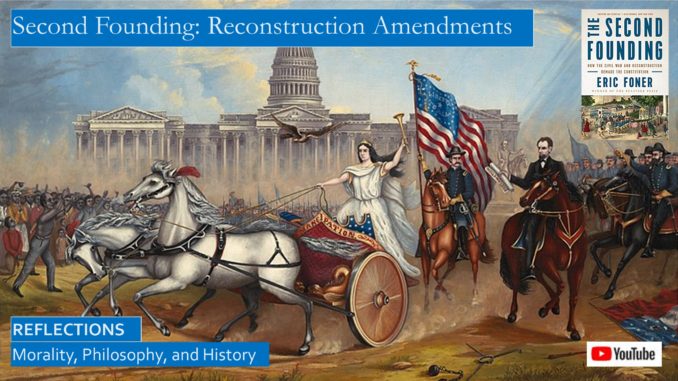
Did the Civil War lead to a Second Founding of the United States? Eric Foner in his book with that title on the Reconstruction amendments and his other books on the Reconstruction era argues forcefully that the Civil War was a political turning point for this country. Before the Civil War, each state determined its own racial policies, but the politics of slavery, then white supremacy, proved so repugnant to the North that it passed these three amendments.
As Eric Foner puts it, “Together with far-reaching congressional legislation meant to provide former slaves with access to the courts, ballot box, and public accommodations, and to protect them against violence, the Reconstruction Amendments greatly enhanced the power of the federal government, transferring much of the authority to define citizens’ rights from the states to the nation.” Each amendment specifically gave the US Congress the authority to enforce these amendments by appropriate legislation.[1]
Please see our YouTube video, with paintings and photos: https://youtu.be/UciDV5laOLg
YouTube script: https://www.slideshare.net/BruceStrom1/second-founding-how-the-civil-war-and-reconstruction-remade-the-constitution-249935856
What were these Reconstruction Amendments?
- Thirteenth Amendment, ratified January 31, 1865: Slavery is abolished, except for convict labor.
- Fourteenth Amendment, ratified July 9, 1868: Everyone born or naturalized is a citizen of the US. All citizens are guaranteed due process under the law
- Fifteenth Amendment, ratified February 3, 1870: All citizens have the right to vote.
The Confederate states had to adopt these Reconstruction amendments before they were readmitted to the Union after their defeat in the Civil War, and their state constitutions had to specifically abolish slavery. There was no possibility these could have been drafted and later ratified had the South not rebelled and seceded from the Union.
When were the Southern States readmitted to the Union?
- July 24, 1866 -Tennessee is the 1st.
- June 22, 1868 – Arkansas is the 2nd
- June 25, 1868 – Florida is the 3rd
- June 25, 1868 – Alabama is the 4th
- June 25, 1868 – Louisiana is the 5th
- June 25, 1868 – North Carolina is 6th
- June 25, 1868 – South Carolina is 7th
- (June 25, 1868 – GEORGIA FIRST readmitted)
- December 22, 1869 – Second reconstruction for Georgia began!
- January 27, 1870 – Virginia is the 8th
- February 23, 1870 – Mississippi is the 9th
- March 30, 1870 – Texas is the 10th
- March 30, 1870 – The 15th Amendment is added to the Constitution.
- GEORGIA READMITTED AGAIN -July 15, 1870 – Georgia is the 11th and last.[2]
These dates confirm that the Fourteenth Amendment was passed when the former Confederate states were forced to ratify it before they could be readmitted to the Union.
Why were the three Reconstruction Amendments passed over a period of five years, rather than immediately after the Civil War? The simple answer is that even in the North there was not universal political support for due process for all citizens, and there were Northern states who did not give blacks the right to vote when the Civil War ended. On the eve of the Civil War, all states except for five New England states restricted the right to vote to white men.[3] Northern support increased for the Reconstruction Amendments after Northerners witnessed the intransience and hubris of the defeated Confederates and the violence and injustices suffered by the former slaves in the Confederate states.
One of the main causes of the Civil War was the 1857 Dred Scott decision, written by Chief Justice Roger Taney, which may have permitted slavery to spread everywhere had the Civil War not erupted. The Taney decision held that no negro had ever enjoyed the rights of a citizen under the Constitution. Negroes were denied the dignity of personhood, negroes were always property and would also remain property, negroes were declared by the Supreme Court decision to be “so far inferior that they had no rights which a white man was bound to respect.” This decision also claimed that “Negros have shown less capacity for government than any race of people,” and “wherever they have been left to their own devices they have shown a constant tendency to relapse into barbarism.”[4] The real issue was that the Southerners did not regard blacks as equal to whites, blacks were seen as subhuman and an inferior race. White supremacists feel this way to this very day.
The Civil War and the Reconstruction Amendments are a repudiation of the Dred Scott decision. Eric Foner notes, “the Civil War crystallized in the minds of northerners the idea of a powerful federal government protecting the rights of citizens. The second founding not only put abolition, equal rights, and black male suffrage into the Constitution, but in its provisions for national enforcement made the federal government, for the first time, what Charles Sumner called ‘the custodian of freedom.’”[5]
CHANGING NORTHERN SENTIMENT DURING THE CIVIL WAR
Before he was elected, Lincoln favored gradual compensated emancipation, which is how most Latin American countries freed their slaves. After his election but before his inauguration several Southern states seceded, explicitly declaring the defense of their slave society as the reason for secession. In the beginning, Lincoln justified the war as a fight to save the Union. But as Eric Foner notes, “a powerful combination of events moved Lincoln to adopt a new policy towards slavery. They included the congressional enactments of 1862; the failure of conventional military strategy to win the war; the desire to forestall European intervention; the need to enlist black soldiers; and the growing number of slaves escaping to Union lines.” In late 1862, in the Emancipation Proclamation,” Lincoln warned the “Confederates that if they did not lay down their arms, Lincoln would decree Emancipation.” “By making the destruction of slavery an objective of the Union Army, the Emancipation Proclamation fundamentally altered the character of the Civil War.”[6] The total abolition of slavery was now inevitable.
We have covered in depth on our blog and video how the book by WEB Dubois, Black Reconstruction, demonstrates that the participation of the slaves assisting the Union cause by running away, spying, and serving in the Union Army helped degrade the ability of the South to wage war and was a major factor in the eventual Union victory.
Many Southern states under Presidential Reconstruction at the end of the Civil War passed incredibly harsh black codes with vagrancy laws. These vagrancy laws required all black men to sign annual labor contracts or be found guilty of vagrancy, in which case they either paid a fine or basically worked involuntarily as a worker for a white man, reintroducing slavery through the back door, slavery in fact if not in name.[7] Due to Northern outrage, the congressmen elected from the Confederate states were denied admission, and these states were placed under Congressional Reconstruction. “Many of these senators and representatives were former Confederate political and military leaders. Their election, together with the unwillingness of the Johnson governments (Confederate states readmitted under Presidential Reconstruction) to acknowledge the basic rights of former slaves, Republicans took as evidence that the white South did not fully accept the results of the Union victory.”[8]
This history is also covered in our blog and video on Black Reconstruction above. WEB Dubois also discusses the role of the Reconstruction Amendments in his history.
FREEDMEN’S BUREAU
The practical enforcement of the Reconstruction Amendments and the civil rights legislation passed after the Civil War often defaulted to the Freedmen’s Bureau, who were backed up and protected by the few Union Army soldiers posted in the military governments of the South.
From my blog on Black Reconstruction:
In the last years of the Civil War the Freedmen’s Bureau was established and renewed periodically through the years of Reconstruction. Though hamstrung by lack of resources, much was accomplished. WEB Dubois writes: “Twelve labors of Hercules faced the Freemen’s Bureau: to make as rapidly as possible a general survey of conditions and needs in every state and locality; to relieve immediate hunger and distress; to appoint state commissioners and upwards of 900 bureau officials; to put the laborers to work at regular wage; to transport laborers, teachers and officials; to furnish land for the peasant; to open schools; to pay bounties to black soldiers and their families; to establish hospitals and guard health; to administer justice between man and former master; to answer continuous and persistent criticism, North and South, black and white; to find funds to pay for all this.”[9]
13th AMENDMENT
The 13th Amendment, which abolished slavery, was ratified a few months prior to end of the Civil War. The text of this amendment is:
Neither slavery nor involuntary servitude, except as a punishment for crime whereof the party shall have been duly convicted, shall exist within the United States, or any place subject to their jurisdiction.
During the 1864 Presidential campaign, which was waged only in the Northern states since the Civil War was still being fought, some Republicans viewed the 13th Amendment abolishing slavery was necessary to win the war, but other politicians thought it was risky, that it would scare away voters needed to reelect Lincoln. When Lincoln won the election, he called on the House to approve the Amendment, which they did, with just a few votes to spare above the needed two-thirds majority. Which meant that many Northerners were not keen to abolish slavery, even while the Civil War was raging.[10]
Ratification of this amendment was necessary for the Confederate states to be readmitted to the Union, even under Presidential Reconstruction. The Confederate states ratified this amendment unwillingly, as Eric Foner notes, “Several former Confederate states ratified the 13th Amendment with the ‘understanding’ that the amendment did not empower Congress to determine the future of the former slaves and did not preclude monetary compensation for the former owners. Such provisos, of course, had no legal standing.”[11]
Once slavery was abolished, then the question then arose: What labor system would replace slavery? Eric Foner says that “all agreed that contractual relations must be substituted for the discipline of the lash and the master’s authority over the personal and family lives of the former slaves ended.”[12] There was some experimentation with a cash wages system, and the Freedmen’s Bureau struggled with implementing a wage system, but the lack of available cash and credit in the Deep South led to sharecropping. Though sharecropping was a deeply exploitive labor system, entrapping black sharecroppers in an unending cycle of debt, it was a small improvement over laboring under the overseer’s whip in the plantations.
Eventually the former Confederate states did implement harsh vagrancy laws that criminalized “loafing,” which meant that any black person picked up by the law in a southern town was automatically put in jail so he could be leased out to plantation owners and other businesses in chain gangs. Many southern states had an extensive convict leasing system, which took advantage of the loophole in the 13th Amendment permitting the servitude of duly convicted criminals. These convict laborers were often treated worse than slaves had been treated, slaves had been valuable property before the Civil War, but now after the Civil the life of a black man had no value. Convict leasing was brutal, many convict laborers died on the job.[13]
During the Redemption Era, after Reconstruction, southern legislatures greatly expanded the number of crimes that were considered felonies, ensnaring more blacks in the judicial system than ever before, which also enabled these states to restrict the right of blacks to vote.[14]
This convict leasing was likely not intentional but, to a certain extent, was simply an historical accident, an unintended consequence. Eric Foner explains, “the prisoner exemption in the 13th Amendment originated in Thomas Jefferson’s proposed Land Ordinance of 1874, which would have barred slavery in all the new nation’s territories. From there, it migrated to the Northwest Ordinance of 1787, which limited the prohibition of slavery to territories north of the Ohio River.” Scholars are not sure exactly why Jefferson included this clause, maybe he ascribed to the Enlightenment concept that work was good to build character. The proponents of the 13th Amendment thought that if it were based on the Northwest Ordinance precedent that would help with ratification. This clause had become almost boilerplate language included in many pieces of legislation over the years, with no ill effects.[15]
Eric Foner concludes this chapter: “The 13th Amendment was not a final answer to the problem of freedom. It turned out to be one indispensable part of a dynamic process that continued for years and gave birth to the 14th and 15th Amendments, further civil rights legislation, and an unprecedented experiment in the South in interracial democracy. ‘Liberty has been won,’ Charles Sumner declared. ‘The battle for equality is still pending.’”[16]
BROADER DEFINITION OF SLAVERY
Missing from Eric Foner’s discussion of slavery is a broader recognition that slavery was nothing but a labor system for the lower classes of society. From the beginning of time the extremely wealthy have envied for even greater wealth, seeking to enslave most workers to a life of penury, caring for the widow and orphan and poor was a constant theme of the Old Testament prophets from millennia past. This can be seen in our blogs on slavery in the ancient world:
wwwww
When FDR was looking forward to a post-war world, he summarized his New Deal policies, hoping to implement their philosophy globally, in the Four Freedoms. Not only did he include the familiar Freedom of speech and freedom of worship, but he also recognized that the Bill of Rights freedoms were but a hollow shell for those who were unable to feed their family. Just as important are the other two freedoms, freedom from want and freedom from fear. The New Deal seeks to ensure that anyone who works a full-time job is entitled to live with dignity, earning enough to adequately feed and clothe his family, and live in decent housing.
https://en.wikipedia.org/wiki/Four_Freedoms
When viewing the Four Freedom paintings illustrations in this article, you could ask if blacks were meant to be excluded from these idyllic Norman Rockwell middle class world? Norman Rockwell did honor blacks in several of his paintings, helping to nudge the cause of civil rights:
https://library.wustl.edu/news/norman-rockwell-and-race-complicating-rockwells-legacy/
How can we claim to have truly abolished slavery if we have a sizable portion of our population earning a minimum wage that is not a living wage? Not everyone has the intellectual capability to attend college, and there are some for whom trade school is a challenge. Should we condemn our least talented but hard-working citizens to a life of hopeless penury?
14th AMENDMENT
No longer could states abuse the rights of their citizens without consequence, with the 14th Amendment the federal government was the final guarantor that all citizens would be guaranteed due process under the law, regardless of which state they resided. All citizens, in all states, were now equal under the law.
This is the text of Section 1 of the 14th Amendment:
All persons born or naturalized in the United States, and subject to the jurisdiction thereof, are citizens of the United States and of the State wherein they reside. No State shall make or enforce any law which shall abridge the privileges or immunities of citizens of the United States; nor shall any State deprive any person of life, liberty, or property, without due process of law; nor deny to any person within its jurisdiction the equal protection of the laws.
Before the Civil War, each state decided who would be entitled to be a citizen. But now, under the 14th Amendment, “all persons born or naturalized in the United States” are considered citizens, which included former slaves. “Today, the United States stands almost alone among industrialized nations” in its broad definition of citizenship.[17]
Radical Republican congressmen like Thaddeus Stevens and Charles Sumner “saw Reconstruction as a one-in-a-lifetime opportunity to purge the republic of the legacy of slavery and guarantee that all Americans enjoyed the same rights and opportunities, secured by a powerful and beneficent national government.”[18]
Congressional midterm elections of 1866 were essentially a referendum on the 14th Amendment, and the Radical Republicans were swept to an emphatic victory in the Northern states. This amendment guaranteed that when the Southern states were readmitted back to the Union, equality of the races and civil rights could not be undone, and the goals of white supremacists would be blocked.[19]
Eric Foner notes, “every effort to expand the rights of blacks was attacked by opponents as sure to lead to ‘social equality,’ a phrase that conjured up images of black-white sexual intimacy and interracial marriage.”[20] “Although unable to prevent the 14th Amendment’s passage, Democrats railed against it as a violation of two norms of American political life, white supremacy and the traditional power of the states to define and regulate the rights of their inhabitants. Months before passage,” after a vicious racist rant in Congress, “a Republican senator remarked, ‘it only comes back to this, that a nigger is a nigger.’” A southern senator confirmed, “that is the whole of it.”[21]
At the time of its passage, there was little debate about the Due Process clause, which was borrowed from the 5th Amendment. Over time, the courts interpreted the Due Process clause to apply to most of the original Bill of Rights amendments, as well as other rights, including the right of privacy. For the first time, equality of citizens is a constitutional right.[22]
The other sections of the 14th Amendment forbade former Confederate officials from holding political office; reduced representation when a state obstructs the voting rights of its citizens, a clause that has never been enforced; and validates US government debt but forbids repayment of Confederate war debt. This last clause was added due to fears that a Southern controlled Congress could seek to wreak havoc on the nation’s finances, some thought it should have been applied during the government debt crisis during the Obama administration.
15th AMENDMENT
The text of the 15th Amendment, guaranteeing all citizens the right to vote, is as follows:
The right of citizens of the United States to vote shall not be denied or abridged by the United States or by any State on account of race, color, or previous condition of servitude.
At the end of the Civil War there were many border states and Northern states that only extended the right to vote to white male citizens, so that 15th Amendment was ratified five years after the 13th Amendment. During the Congressional debates of the 14th Amendment, there was resistance to extending the right to vote to black men.[23] Some thought the 14th Amendment implied that former slaves would have the right to vote, but this notion faded after witnessing Southern hostility towards black suffrage.
The political leaning of the North prior to General Ulysses Grant’s Presidential campaign of 1868 was that it was necessary to force the readmitted Southern states to extend the franchise to former slaves, but that each Northern state should decide the black suffrage question for themselves. This was a controversial issue in this election, the Democrats accused the Republicans of forcing “Negro supremacy” on the South, there was talk of overthrowing Reconstruction, which would eventually happen in the 1876 Election compromise. Grant’s resounding electoral victory greatly advanced the cause of the 15th Amendment granting the right to vote to all citizens.[24] Grant was inaugurated shortly before Congress passed the 15th Amendment, he encouraged its ratification in his Inaugural Address. Although it was passed quickly by the Southern biracial Reconstruction states, its ratification by border and Northern states was more problematic than was the case for the 13th and 14th Amendments.[25]
Congress was aware that the right to vote could be circumvented by obstacles like poll taxes, literacy tests, and other ostensibly nonracial requirements, which later happened during the Redemption Era in the Deep South, butting adding these provisions to the 15th Amendment would have made it more difficult to ratify.[26]
Southerners were alarmed and threatened by the intense political participation by the newly freed slaves, attending the frequent political meetings and rallies were common pastimes. The Ku Klux Klan and similar white terrorist groups sought to discourage blacks from voting.
KKK ENFORCEMENT ACTS
Particularly in the late 1860’s and early 1870’s, white supremacist terrorists such as the Ku Klux Klan were guilty of acts assault, arson and murder committed not only against blacks but also anyone sympathetic towards blacks, including Republicans, teachers, and scalawags, or Southerners sympathetic towards blacks. Their claim to be protectors of white womanhood included sexual assaults against black women. If victims reported their crimes to the police and courts, they were subject to further retaliation. Local officials were paralyzed in their efforts to stem the violence without the help of federal troops and officials.
Outrage led to the passage of Enforcement Acts in 1871 that dramatically increased the federal government’s power to curb the violence, even permitting the suspension of the right of habeus corpus when necessary to restore order, granting the federal government authority to prosecute murders and assaults. President Grant used these sweeping powers to enable federal troops to crush the Ku Klux Klan. But these many prosecutions swamped the federal court system. Grant’s reelection ensured that this enforcement could continue, but this level of federal involvement in local law enforcement could not last for long.[27]
SUPREME COURT SLOW TO IMPLEMENT
Roger Taney Scott remained on the Supreme Court during the Civil War until he died on October 12, 1864. Southern Democrats were a majority of Supreme Court justices until the death of Taney.[28] Although Lincoln issued no public statement, he did attend a memorial service on his death, and appointed Salmon P Chase, a strong anti-slavery Republican from Ohio as Chief Justice.[29]
Although Lincoln appointed several Radical Republicans to the Supreme Court, the Presidents from 1870 to 1900 mostly appointed as justices to the high court lawyers from privileged backgrounds, including numerous railroad lawyers, who had little interest in civil rights. Although the due process clause was applied to many unforeseen legal situations, cases where due process was granted to blacks suffering injustice and discrimination were not that common.
Northern enthusiasm for the enforcement of the civil rights laws in the former Confederacy in the face of continual violence by white supremacist terrorists waned after the Panic of 1873, which was a major recession. This led to the contested Presidential Election of 1876, which was settled by the Compromise of 1877, where the federal government agreed to pull their troops out of the Southern states. This led to the eventual takeover of the Southern governments by white supremacist Democrats, who basically reenacted the old black codes under the Jim Crow laws, denying blacks the right to vote, due process, and equality under the law until the new round of civil rights legislation in the 1960’s.[30] White supremacists once again terrorized the blacks and their sympathizers, but now blacks had no legal recourse, and when blacks reported crimes by whites, often the blacks were the ones arrested.
This toleration of the Jim Crow racial laws also applied to the Supreme Court rulings at the time, which basically ignored the intent of the Reconstruction Amendments in very narrow legal constructions, which finally crumbled in the Warner Court years. The original intent was ignored in the Slaughterhouse case, where the 14th Amendment was held to only apply to federal citizenship, not state citizenship. Likewise, voting restrictions were ruled to be legal as long as they were not specifically racial in character. The Supreme Court in the Robber Baron years in the early 20th Century was much more resolute in applying the Due Process clause of the 14th Amendment to corporations, but for blacks, there was not much interest in ruling in favor of due process. Eric Foner details this dreary history in dreary detail in the last chapter of the book. Let us pray that the current Supreme Court will interpret the Reconstruction Amendments according to the original intent of the Radical Republicans.
GREAT DISSENTER, JOHN MARSHALL HARLAN
There was one ray of hope, one ray of sunshine, one Supreme Court Justice who carried the torch of freedom and civil rights during those dark Jim Crow days following Reconstruction, John Marshall Harlan, known as the Great Dissenter.
John Marshall Harlan was appointed to the Supreme Court by Rutherford Hayes after the Compromise of 1877. Harlan was a former slaveholder from Kentucky, he had served in the Kentucky militia for the Union in the Civil War, but was a reluctant Republican. President Hayes wanted to appoint a justice from the South to promote national unity, but remarkably he was known as a dissenter who faithfully supported civil rights and the original intent of the Reconstruction Amendments.[31]
Eric Foner quotes Harlan in his famous lone dissent in the “separate but equal” Plessy v. Ferguson case of 1896, the dissent that was influential for the unanimous opinion in the 1954 Brown v. Board of Education case that desegregated public schools. Plessy was an NAACP test case where Plessy, a black man, bought a first class railroad ticket, and was arrested when he refused to move to the blacks only carriage, in violation of the state Jim Crow law. The majority opinion ruled that separate facilities for whites and blacks were permitted as long as they were equal.
This is what Eric Foner wrote, edited for conciseness:
“The white race,” Harlan wrote, was undoubtedly the dominant race” in wealth, power, prestige, and achievements. However, the Constitution itself is color-blind. The thin disguise of equal facilities was not an innocuous separation of the races, but is rather an expression of racial dominance rooted in slavery. The law assumed that blacks were “so inferior and degraded that they cannot be allowed to sit in proximity to white persons.” “In my opinion,” Harlan added, “the judgement this day rendered will, in time, prove to be as pernicious as the Dred Scott opinion.” Harlan correctly predicted that the decision would unleash a flood of statutes segregating every realm of Southern life. In fact, segregated facilities were never equal.[32]
[1] Eric Foner, The Second Founding (New York: WW Norton & Company, 2019), Preface.
[2] https://www.funtrivia.com/askft/Question26593.html
[3] Eric Foner, The Second Founding, p. 5.
[4] Eric Foner, The Second Founding, p. 14, and also search my blogs for “Taney”.
[5] Eric Foner, The Second Founding, p. 17.
[6] Eric Foner, The Second Founding, p. 24, 27.
[7] Eric Foner, The Second Founding, p. 48.
[8] Eric Foner, The Second Founding, p. 56.
[9] WEB Dubois, Black Reconstruction (New York: The Free Press, 1935, 1962, 1998), pp. 223-225.
[10] Eric Foner, The Second Founding, p. 35.
[11] Eric Foner, The Second Founding, p. 39.
[12] Eric Foner, The Second Founding, p. 40.
[13] Douglas Blackmon, Slavery By Another Name, which will be the subject of a future blog and video. WEB Dubois in Black Reconstruction, and Eric Foner in his histories of Reconstruction, also discuss convict leasing.
[14] Eric Foner, The Second Founding, p. 110.
[15] Eric Foner, The Second Founding, p. 46.
[16] Eric Foner, The Second Founding, p. 54.
[17] Eric Foner, The Second Founding, p. 71.
[18] Eric Foner, The Second Founding, p. 56.
[19] Eric Foner, The Second Founding, p. 89.
[20] Eric Foner, The Second Founding, p. 7.
[21] Eric Foner, The Second Founding, p. 86.
[22] Eric Foner, The Second Founding, pp. 76-77.
[23] Eric Foner, The Second Founding, p. 61.
[24] Eric Foner, The Second Founding, pp. 96-98.
[25] Eric Foner, The Second Founding, pp. 107-108.
[26] Eric Foner, The Second Founding, pp. 104-105.
[27] Eric Foner, The Second Founding, pp. 116-122.
[28] Eric Foner, The Second Founding, p. 28.
[29] https://en.wikipedia.org/wiki/Roger_B._Taney
[30] Eric Foner, The Second Founding, pp. 126-131.
[31] Eric Foner, The Second Founding, p. 28, and https://en.wikipedia.org/wiki/John_Marshall_Harlan
[32] Eric Foner, The Second Founding, pp. 160-164.

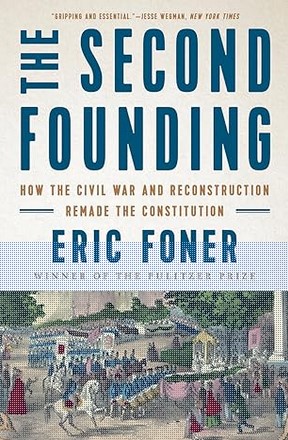
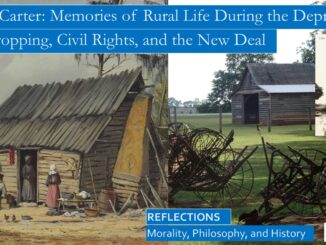
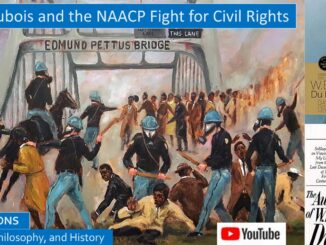
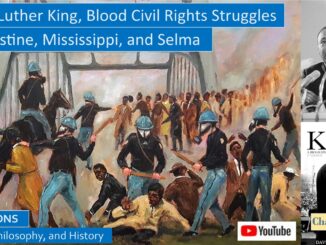
6 Trackbacks / Pingbacks